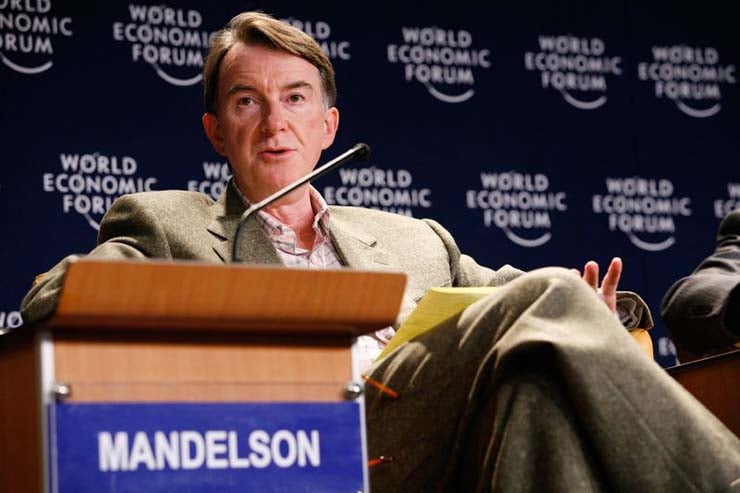“Reckless and a danger to the world,” was how Peter Mandelson—Lord Mandelson, a longtime senior official in the UK’s Labour Party who now sits in the House of Lords as a life peer—described the once and future U.S. President Donald J. Trump in an interview with an Italian journalist in 2019, during Trump’s first presidency. In other public statements, Mandelson has called Trump a “bully” and “little short of a white nationalist and racist.”
Last week, the UK’s new Labour Prime Minister Sir Keir Starmer announced without a trace of irony that he was “delighted” to appoint the same Mandelson his country’s new ambassador to the United States. He hopes the noble lord, who was confirmed by the British government on Friday, will use what Starmer calls his “unrivalled experience” to help both countries “move into a new chapter in our friendship” when President Trump returns to office next month. Mandelson, who has never served in any diplomatic role and would be a rare political appointment among UK envoys, expressed appreciation for what he described as a “great honour.” With no apparent regard for how he is perceived on this side of the Atlantic, his lordship told the BBC it is “absolutely essential that we establish a relationship with President Trump that enables us not only to understand and interpret what he’s doing but to influence it.”
Good luck with that, milord. Trump adviser Chris LaCivita has already, and reportedly with the returning president’s authorization, dismissed Mandelson on X as an “absolute moron” who should “stay home.” At home, former Conservative Party leader Sir Iain Duncan Smith, who remains a senior member of Parliament, has called for an investigation into “whether or not this is reliable or anyway likely to cause offence in the United States.” While Mandelson’s controversial statements have been widely reported in the U.S. media, the British press has been characteristically relentless, commenting not only on Mandelson’s statements but also on his checkered political past, aspects of his private life, rumored connections to Jeffrey Epstein, Chinese business contacts, and, perhaps most damningly of all, strong speculation that he will simply fail in his mission.
Just one month before his nomination, Mandelson himself publicly argued that his political opposite, Reform UK leader Nigel Farage, whose party sits to the right of the Conservatives and now actively competes against both Conservatives and Labour, would be the right man for the job of establishing an effective dialogue with Trump, a role Farage has said he is willing to take. If Mandelson had any more doubts about his own unsuitability for his proposed role, he may wish to consult with his fellow life peer Lord Darroch of Kew, who, as Sir Kim Darroch, resigned from the Washington embassy posting in 2019 after leaked cables revealed he had called Trump’s first administration “clumsy and inept.” That was enough for Trump to declare he would no longer work with Darroch, who then admitted it was time for a new ambassador and soon left his post to write a bitter memoir.
President Trump should make it easy for the befuddled Brits and reject Mandelson’s accreditation as ambassador. For an economically shattered country hoping to negotiate a favorable trade deal with the world’s leading economy in the post-Brexit era, an arrogant man who has publicly insulted our president multiple times is certainly not the right person for the job. There are probably millions of Britons, (including Farage—who is already close to Trump), and Dame Karen Pierce, the UK’s highly effective and widely respected current ambassador, who could do better. If Mandelson comes to Washington, he will be a lame duck from day one, unimportant and ignored, isolated and lost, incapable of either commanding respect or inspiring trust, impeding rather than facilitating the prosperity of his country and its people.
Usually, the appointments process is pro forma. After all, very few national leaders deliberately nominate individuals they know to be objectionable to represent them in other countries, especially important allies. At the same time, receiving governments are often willing to overlook controversial details or limited qualifications to avoid causing offense. Starmer, however, has not been much of a success in anything since he entered office in July and should get no pass here.
The legal authority for rejecting Mandelson is unimpeachable. The Vienna Convention on Diplomatic Relations and Optional Protocols, adopted as the international standard governing diplomacy in 1961, specifically requires that “the sending State must make certain that the agreement of the receiving State has been given for the person it proposes to accredit as head of the mission to that State.” If that person is rejected, the Convention continues, “the receiving State is not obliged to give reasons to the sending State for a refusal of agreement.” This means that the new Trump administration must actively agree to accept Mandelson’s appointment, along with the appointments of all other foreign ambassadors. If it chooses not to accept Mandelson, however, it can decline for any reason or none, with no obligation to disclose why but with the freedom to comment if it so chooses. As the media has revealed, there is a lot to say, and none of it is good. Mandelson should stay home.

Leave a Reply